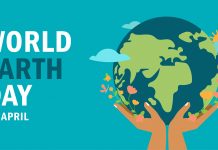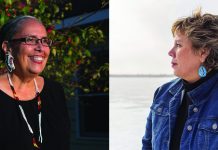
Outdoor Afro guide Alora Jones
photo by Jamey Guy
Alora Jones is an outdoor recreation enthusiast who leads members of underserved communities into Minnesota parks. By day, the 27-year-old from Eden Prairie is the marketing and communications manager at the Loppet Foundation, which organizes outdoor activities in Minneapolis. A few years ago, Jones started volunteering with Outdoor Afro (on Facebook), a national network that helps African Americans connect with nature, wildlife, and one another. For Jones, communing with Minnesota’s natural spaces is more than just a hobby—it’s a critical act of self-care.
Did you grow up doing outdoor activities with your family?
I grew up as a passive, laissez-faire outdoors person. My family is not very outdoorsy. We’re very much a beach resort family. So when we would do stuff in nature, it would be for a day trip for a few hours, and we’d be back at the hotel by sundown. That was my outdoor experience. I started doing more hiking and camping and paddling in my late teens and early 20s. My first camping experience was in Schroeder, Minnesota, which is about an hour north of Duluth.
You’ve gone from being a passive outdoors person to leading paddling and hiking trips and working for environmental organizations. How did that happen?
I stumbled into working in the environmental field. My last semester of college, I was looking for any place that would give me an internship, and I ended up at Mississippi Park Connection. Being around the type of people who work for Mississippi Park Connection and the National Park Service encouraged me to become outdoorsy. I enjoy learning about the natural world in my own way. Last summer, I became a Minnesota Master Naturalist volunteer. We learned about invasive species management, wildlife, and how different flora interacts with different fauna. Apparently, wildflowers are my thing.
Do you have a favorite outdoor activity?
I love camping and hiking because they’re very accessible and approachable activities. They’re fun. They don’t require a lot of commitment or special technical gear. Sleeping outside is just so good for you as far as resetting your batteries.
What makes Minnesota’s outdoor spaces special?
Minnesota has a unique mix of landscapes, from the northern forest to the big woods to the prairie. We have three different biomes in Minnesota, which is pretty unique. Here in the Twin Cities, we’re in the big woods-big rivers biome. The other thing I love about Minnesota is our lakes and our rivers. The human connection to water is really important. The fact that it’s so abundant means we can have a spiritual experience in a city park.

For the last few years, you’ve been leading trips with Outdoor Afro as a volunteer. How do you explain what Outdoor Afro is to people who don’t know anything about it?
Outdoor Afro’s mission is to celebrate and inspire black leadership and connections in nature. Anyone who supports our mission is welcome to attend our events, but obviously our focus is on black people. Outdoor Afro has communities across the country led by people like me who create opportunities for black people to get together and enjoy nature. It can take the form of a paddling activity or something as simple as a hike. Some people will do scuba diving or zip lining. Anything you can think of has probably been done.
Tell me about the first Outdoor Afro trip you led here in Minnesota.
I led a hike at Minnehaha Falls. We were walking past this white family, and the little girl was like, “Wow, Mom, there’s a lot of black people here today!” Clearly, it reinforced why this is important, and why I’m doing it through Outdoor Afro.
What did that girl’s comment reinforce for you?
It shouldn’t be a surprise that black people enjoy natural spaces. That’s a very human and primal thing. So the idea that it’s just a white thing is a lie and is harmful. Visibility is important. If I’m a young kid, and I don’t see people who look like me climbing mountains and being awesome then I won’t consider it as a possibility for myself.
What have you learned as an Outdoor Afro leader about reconnecting people of color with outdoor experiences?
The biggest lesson I’ve learned is how important it is to the greater conservation movement. The demographics of the country are changing. If green is going to continue to be a thing, we all have a role to play. When I first got involved with Outdoor Afro, I didn’t really consider myself the most outdoorsy person. I was more interested in creating those black spaces because I’d never had those experiences and spaces growing up in a predominantly white environment. When I went on my first camping trip with all black people, it was kind of spiritual and life-changing. So creating those spaces was more important for me than necessarily communing with nature. It was more about communing with each other.
What are your future goals with Outdoor Afro?
I recently signed on to climb Mount Kilimanjaro this June. I’m going with 12 other Outdoor Afro leaders from around the country. I hope it will inspire some more interesting adventure activities for my Outdoor Afro network here. I’d love to take folks camping in the Boundary Waters Canoe Area Wilderness after I have this experience.
Do you see the work that you’re doing as activism?
Yes. In activist circles, there’s this phrase known as self-care. I think it’s important that people prioritize time for communing with nature as a way of maintaining good psychological health, and creating spaces where we can do it together and people don’t feel alone. I realize there are physical benefits to being outdoors, but honestly what motivated me more to get into this work were the psychological benefits. I think black people in America have long suffered from a lot of trauma, and that’s at the source of a lot of our health problems, both mental and physical. For me personally, just being able to get outside, ride my bike, and go sit in the woods and commune with nature has always been a source of respite and solace. I think it’s important that everyone prioritizes that because we all need it.








